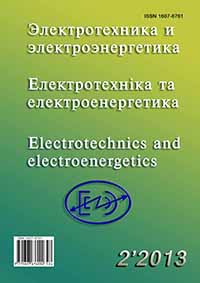IRP P-Q THEORY FOR ACTIVE POWER FILTERS. LIMITATION OF APPLICATION
DOI:
https://doi.org/10.15588/1607-6761-2013-2-4Keywords:
energy-saving technologies, IRP p-q theory, active power filter, supply voltage unbalanceAbstract
The articled is devoted to «p-q» instantaneous reactive power theory. Two facts of critics of this power theory is analyzed. The first critical fact is about wrong current compensation in case of active current filter which works in power net with unbalanced voltage. It was shown that coordinate transform matrixes don’t consist to zero sequence component that included to transform matrixes «artificially». The second critical fact describes wrong compensation when supply voltage consists of higher harmonics. This drawback is connected with inability of separate harmonics for compensation. Finally it was shown that devices based on IRP «p-q» theory perform criterion of uniform power consumption even if supply voltage is distorted or unbalanced.References
Akagi H. Generalized Theory of the Instantaneous Reactive Power in Three-Phase Circuits / H. Akagi, Y. Kanazawa, A. Nabae // IPEC’83 – Int. Power Electronics Conf. – 1983. – P. 1375–1386.
Czarnecki L. S. On some misinterpretations of the Instantaneous Reactive Power p-q Theory / L. S. Czarnecki // IEEE Trans. On Power Electronics. – 2004. Vol. 19, No. 3. – P. 828–836.
Czarnecki L. S. Effects of supply voltage asymmetry on IRP p-q theory based switching compensator control / L.S. Czarnecki // IET on Power Electronics. – 2010. – Vol. 3, No. 1. – P. 11–17.
The New IEEE Standard Dictionary of Electrical and Electronics Terms / [chair Gediminas P. Kurpis]. – IEEE : New York, 1993. – 1619 p.
Tolbert L. M. Comparision of Time Based Nonactive Power Definitions for Active Filtering / L. M. Tolbert, T. G. Halbetler // Power Electronics Congress CIEP 2000. – 2000. – October 2000. – P. 73–79.
Бурлака В.В. Огляд методів управління активними фільтрами / В. В. Бурлака, С. К. Поднебенна, М. Д. Дяченко // Електромеханічні і енергозберігаючі системи. – Кременчук : КрНУ, 2012. – Вип. 1/ 2011 (13). – С. 51–54.
Усольцев А. А. Частотное управление асинхронными двигателями : учебное пособие / А. А. Усольцев. – С. Пб. : СПбГУ ИТМО, 2006. – 94 с.
Depenbrock M. A Concise Assessment of original and Modified Instantaneous Power Theory Applied to FourWire Systems, Proceedings of the References /
M. Depenbrock et al // Power Conversion Conference, Osaka, Japan, vol.1 Volume: 1. – April 2002. – pp. 60–67.
Балансэнергийв электрическихцепях / [ТонкальИ.Е., Новосельцев А. В., ДенисюкС.П. та ін.]. – К. : Наукова Думка, 1992. – 312 с.
K Syed Moinuddin Instantaneous power theory based active power filter: a matlab/ simulink approach / Moinuddin K Syed, Dr. BV Sanker Ram // Journal of Theoretical and Applied Information Technology. –2008. – Vol. 4, No. 6. – pp. 536–541.
Downloads
How to Cite
Issue
Section
License
Copyright (c) 2017 A. F. Sinolitsyy, V. A. Kolsun, V. S. Kozlov

This work is licensed under a Creative Commons Attribution 4.0 International License.
Creative Commons Licensing Notifications in the Copyright Notices
Authors who publish with this journal agree to the following terms:
Authors retain copyright and grant the journal right of first publication with the work simultaneously licensed under aCreative Commons Attribution License that allows others to share the work with an acknowledgement of the work's authorship and initial publication in this journal.
Authors are able to enter into separate, additional contractual arrangements for the non-exclusive distribution of the journal's published version of the work (e.g., post it to an institutional repository or publish it in a book), with an acknowledgement of its initial publication in this journal.
Authors are permitted and encouraged to post their work online (e.g., in institutional repositories or on their website) prior to and during the submission process, as it can lead to productive exchanges, as well as earlier and greater citation of published work.

